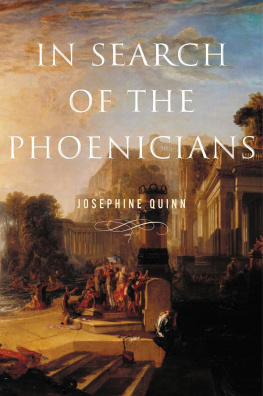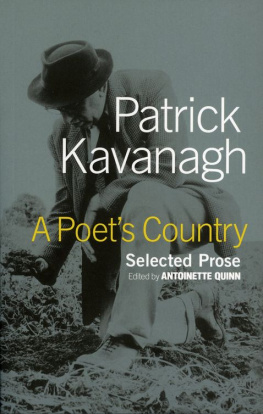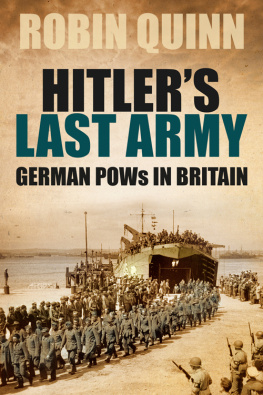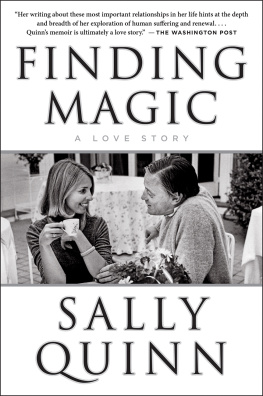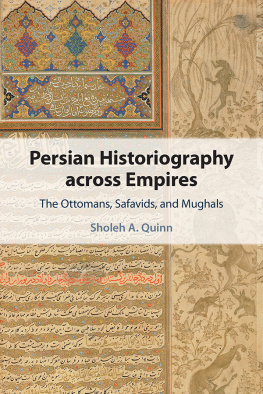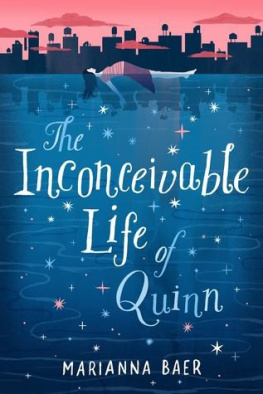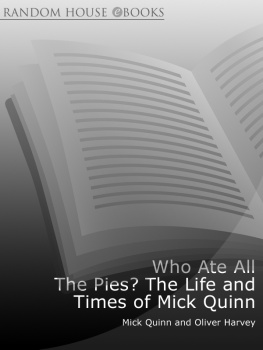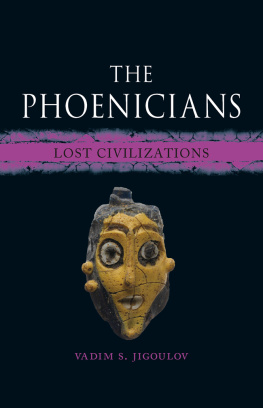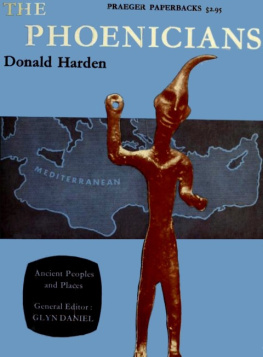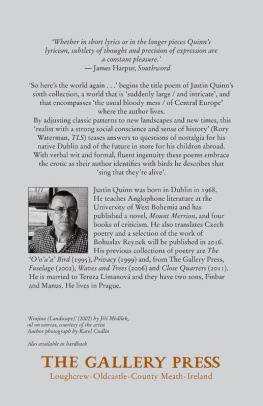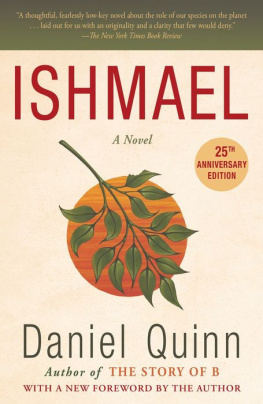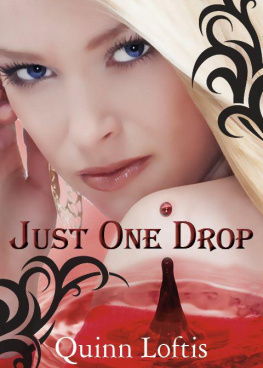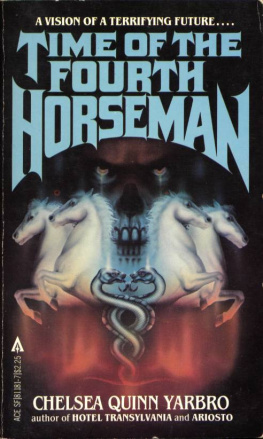Quinn - In Search of the Phoenicians
Here you can read online Quinn - In Search of the Phoenicians full text of the book (entire story) in english for free. Download pdf and epub, get meaning, cover and reviews about this ebook. year: 2017, publisher: Princeton University Press, genre: Politics. Description of the work, (preface) as well as reviews are available. Best literature library LitArk.com created for fans of good reading and offers a wide selection of genres:
Romance novel
Science fiction
Adventure
Detective
Science
History
Home and family
Prose
Art
Politics
Computer
Non-fiction
Religion
Business
Children
Humor
Choose a favorite category and find really read worthwhile books. Enjoy immersion in the world of imagination, feel the emotions of the characters or learn something new for yourself, make an fascinating discovery.
In Search of the Phoenicians: summary, description and annotation
We offer to read an annotation, description, summary or preface (depends on what the author of the book "In Search of the Phoenicians" wrote himself). If you haven't found the necessary information about the book — write in the comments, we will try to find it.
Quinn: author's other books
Who wrote In Search of the Phoenicians? Find out the surname, the name of the author of the book and a list of all author's works by series.
In Search of the Phoenicians — read online for free the complete book (whole text) full work
Below is the text of the book, divided by pages. System saving the place of the last page read, allows you to conveniently read the book "In Search of the Phoenicians" online for free, without having to search again every time where you left off. Put a bookmark, and you can go to the page where you finished reading at any time.
Font size:
Interval:
Bookmark:

IN SEARCH OF THE PHOENICIANS

MIRIAM S. BALMUTH LECTURES IN ANCIENT
HISTORY AND ARCHAEOLOGY
Imperialism, Power, and Identity: Experiencing the Roman Empire,
David J. Mattingly
IN SEARCH
OF THE
PHOENICIANS

JOSEPHINE CRAWLEY QUINN
PRINCETON UNIVERSITY PRESS
PRINCETON & OXFORD
Copyright 2018 by Princeton University Press
Published by Princeton University Press, 41 William Street, Princeton, New Jersey 08540
In the United Kingdom: Princeton University Press, 6 Oxford Street, Woodstock, Oxfordshire OX20 1TR
press.princeton.edu
Jacket art: Joseph Mallord William Turner, The Decline of the Carthaginian Empire, 1817 Tate Modern, 2017
All Rights Reserved
ISBN 978-0-691-17527-0
Library of Congress Control Number: 2017935146
British Library Cataloging-in-Publication Data is available
This book has been composed in Linux Libertine O
Printed on acid-free paper.
Printed in the United States of America
10 9 8 7 6 5 4 3 2 1
For Christopher
CONTENTS

PART I
PHANTOM PHOENICIANS
PART II
MANY WORLDS


All abbreviations are as in The Oxford Classical Dictionary (4th ed., 2012), except the following:
ANET 3 Pritchard, James B., ed. 1969. Ancient Near Eastern Texts Relating to the Old Testament. 3rd ed. Princeton, NJ: Princeton University Press.
AT Wiseman, Donald J. 1953. The Alalakh Tablets. London: British Institute of Archaeology at Ankara.
BMC Hill, George F. 1910. Catalogue of the Greek Coins of Phoenicia. London: Trustees of the British Museum.
BMCV Wroth, Warwick W. 1911. Catalogues of the coins of the Vandals,Ostrogoths and Lombards and of the empires of Thessalonica, Nicaea and Trebizond in the British Museum. London: Trustees of the British Museum.
C.Ord.Ptol.2 Lenger, Marie-Therse. 1980. Corpus des ordonnances des Ptolmes. 2nd ed. Brussels: Palais des acadmies.
C. Ptol. Sklav. Scholl, Reinhold. 1990. Corpus der ptolemischen Sklaventexte. Stuttgart: Franz Steiner.
DNWSI Hoftijzer, Jacob, and Karel Jongeling. 1995. Dictionary of the North-West Semitic Inscriptions. Leiden: Brill.
EH Berthier, Andr, and Ren Charlier. 1955. Le sanctuaire punique dEl-Hofra Constantine. Paris: Arts et mtiers graphiques.
Enc. Berb. Encyclopdie berbre. 19842010. Aix-en-Provence: disud; 2010 . Leuven: Peeters.
IEphesos Wankel, Hermann, Helmut Engelmann, Johannes Noll, et al. 197984. Die Inschriften von Ephesos. Bonn: Habelt.
IGLS Jalabert, Louis, Ren Mouterde et al. 1929. Inscriptions grecques et latines de la Syrie. Paris: P. Geuthner.
IKition Yon, Marguerite. 2004. Kition-Bamboula V: Kition dans les textes. Testimonia littraires et pigraphiques et corpus des inscriptions. Paris: ditions recherche sur les civilisations.
IPergamon Frnkel, Max. 189095. Die Inschriften von Pergamon. Berlin: W. Spemann.
IPT Levi della Vida, Giorgio and Maria Giulia Amadasi Guzzo. 1987. Iscrizioni puniche della Tripolitania (19271967). Rome: LErma di Bretschneider.
IRT Ward-Perkins, John B. and Joyce M. Reynolds. 1953. Inscriptions of Roman Tripolitania. Rome and London: British School at Rome.
KAI 5 Donner, Herbert, and Wolfgang Rllig. 2002. Kanaanische und aramische Inschriften. 5th ed. Wiesbaden: Harrassowitz.
KTU 3 Dietrich, Manfried, Oswald Loretz, and Joaqun Sanmartn. 2013. Die keilalphabetischen Texte aus Ugarit, Ras Ibn Hani und anderen Orten. 3rd ed. Mnster: Ugarit-Verlag.
ODNB Matthew, Henry C. G., and Bryan Harrison. 2004. Oxford Dictionary of National Biography. New ed. Oxford: Oxford University Press.
PPG 3 Friedrich, Johannes, Wolfgang Rllig, Maria Giulia Amadasi Guzzo, and Werner Mayer. 1999. Phnizisch-punische Grammatik. 3rd ed. Rome: Pontificio Istituto Biblico.
RS Rpertoire dpigraphie smitique. 19001968. Paris: Imprimerie nationale.
RPC Burnett, Andrew, Michel Amandry, Pere Pau Ripolls Alegre, Ian Carradice, and Marguerite S. Butcher. 1992 . Roman Provincial Coinage. London: British Museum Press.
TDOT Botterweck, G. Johannes, Helmer Ringgren, and Heinz-Josef Fabry. 1974 . Theological Dictionary of the Old Testament. Grand Rapids, MI: Eerdmans.
TSSI Gibson, John C. L. 197182. Textbook of Syrian Semitic Inscriptions. Oxford: Clarendon Press.
TWOT Harris, R. Laird, Gleason Archer, and Bruce Waltke. 1980. Theological Wordbook of the Old Testament. Chicago: Moody Press.

I want to begin a long way from Phoenicia: in Ireland, at the end of Brian Friels play Translations, which was first performed at the Guildhall in Derry in 1980. We are in a schoolroom in Baile Beag, the small town in County Donegal in which Friel set many of his plays. The year is 1833, shortly after the British have established a system of National Schools, with English as the language of instruction, as an alternative to these more informal hedge schools that taught in Irish. Even more recently a group of British soldiers have arrived in Baile Beag as part of the new Ordnance Survey of Ireland, which is replacing every Irish place name with an English equivalent, and a lieutenant called George Yolland has gone missing after a dance. The wrath of the British Army descends on the town as a whole, and Captain Lancey has just announced that unless information as to the whereabouts of the young man is forthcoming within twenty-four hours, all the livestock in the town will be shot, and that twenty-four hours later the settlement itself will be razed to the ground. Amidst the ensuing panic, the old schoolmaster Hugh ODonnell remains on stage with his old students Maire and Jimmy Jack, and a few drinks inside him. He leaves his pupils and the audience with the Roman poet Virgils description of Carthage, translating from Latin into Irish as he goes:
Urbs antiqua fuitthere was an ancient city which, tis said, Juno loved above all the lands. And it was the goddesss aim and cherished hope that here should be the capital of all nationsshould the fates perchance allow that. Yet in truth she discovered that a race was springing from Trojan blood to overthrow some day these Tyrian towersa people late regum belloque superbumkings of broad realms and proud in war who would come forth for Lybias downfallsuch wassuch was the courseWhat the hells wrong with me? Sure I know it backways. Ill begin again...
What are these lines from book 1 of the Aeneid doing in a play about the experience of British imperialism in Ireland? Friel is alluding here to an Irish intellectual fashion popular in Hughs younger days that postulated ancient Phoenician settlement on the island and influence on its culture, with some scholars even tracing the Irish language back to Phoenician. This theory encouraged people to interpret the British colonial occupation of Ireland in terms of the great struggle between noble Carthage and savage
Next pageFont size:
Interval:
Bookmark:
Similar books «In Search of the Phoenicians»
Look at similar books to In Search of the Phoenicians. We have selected literature similar in name and meaning in the hope of providing readers with more options to find new, interesting, not yet read works.
Discussion, reviews of the book In Search of the Phoenicians and just readers' own opinions. Leave your comments, write what you think about the work, its meaning or the main characters. Specify what exactly you liked and what you didn't like, and why you think so.

